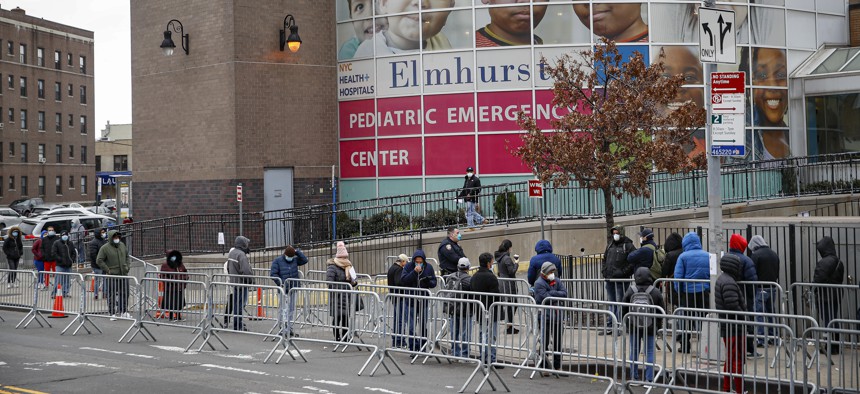Aid for States Lacking in $2 Trillion Deal, New York and Maryland Governors Say

Patients wear personal protective equipment while maintaining social distancing as they wait in line for a COVID-19 test at Elmhurst Hospital Center, Wednesday, March 25, 2020, in New York. AP Photo/John Minchillo

Connecting state and local government leaders
New York Governor Andrew Cuomo called the estimated $3.8 billion his state would receive through the aid package a “drop in the bucket.”
The $2 trillion coronavirus aid package agreed to by the Senate and the White House comes up short on money for states, said two governors who pledged Wednesday to lobby House leaders for more direct assistance in a final bill.
New York Governor Andrew Cuomo was particularly critical of the Senate’s aid package, saying the $3.8 billion it provided directly to his hard-hit state “is a drop in the bucket as to need.”
A rival proposal drafted by House Democrats would have provided $17 billion directly to New York, Cuomo said.
“We need the House to make adjustments,” Cuomo said.
States are largely shouldering much of the initial cost of the response to the pandemic outbreak, and Cuomo said New York’s response could top $15 billion.
Republicans and Democrats worked into the night Tuesday to come to an agreement on the historic aid package, which is both meant to support institutions like hospitals overwhelmed by patients and people suddenly thrown out of work as states’ restrict movements to stem the spread of the coronavirus. After days of intense negotiations, Senate Majority Leader Mitch McConnell announced agreement on the bill just after 1 a.m. Wednesday. He expects a vote on the bill Wednesday afternoon.
The Senate bill includes $150 billion in grants for hospitals and healthcare systems battling the outbreak, direct cash payments to many Americans, $150 billion for state and local governments, and an expansion of unemployment benefits.
Maryland Governor Larry Hogan, who serves as chairman of the National Governors Association, urged senators to pass the bill. But he also emphasized that governors had made a pitch for their states to receive much more from the aid package.
"Last week, the governors requested that one half of the federal stimulus package go directly to the states,” Hogan said Wednesday. “The good news is the Senate has agreed to some aid to the states. And while it is not enough, I know they are negotiating back and forth with the House and it is encouraging that both parties have come to an agreement."
House Majority Leader Steny Hoyer said the legislation agreed upon by Republicans and Democrats in the Senate will be reviewed closely by Democratic leaders in the House.
“I will be conferring with the Speaker and other House leaders to determine the best way for the House to consider the legislation the Senate passes,” he said.
Laura Maggi contributed to this report.

NEXT STORY: NLC posts data on cities’ COVID-19 responses




